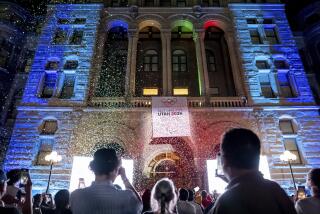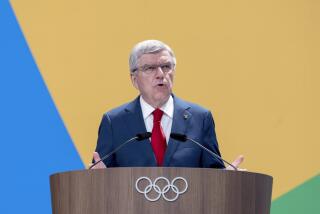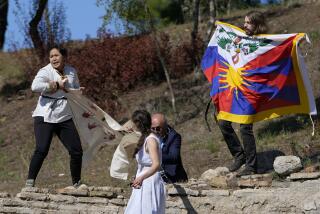Italian, Olympic Officials at Odds
- Share via
With just over 100 days until the start of the 2006 Winter Games, Olympic and Italian government authorities appear at an impasse over the imposition of Italy’s tough anti-doping laws at the Turin competition.
But IOC President Jacques Rogge said Friday he is “confident a working solution” can be reached.
Rogge, speaking at a news conference in Lausanne, Switzerland, also said that despite concerns over the anti-doping laws and budget problems, “things look very good for excellent Games.”
The 2006 Olympics open on Feb. 10. The Olympic torch is due to arrive in Rome Dec. 8, when it will begin a two-month journey around Italy before arriving at Turin’s Olympic Stadium.
The Italian doping issue has lingered for years but emerged in recent months as a threat to the operation of the 2006 Games, overshadowing such typical pre-Games concerns as the pace of construction and security.
Italian law allows authorities to arrest athletes suspected of using performance-enhancing substances, raising the specter of police raids in the athletes’ village. Rogge acknowledged the Italian government has been unwilling to suspend the laws during the Games.
Olympic rules call for an athlete using banned substances to be suspended from competition. The IOC announced it intends to conduct 1,200 drug tests in Turin, a 45% increase over the number in Salt Lake City in 2002.
The World Anti-Doping Agency, like the IOC, has supported a moratorium for the period of the Games. “It is a question of sporting ethics rather than a question of crime and criminality,” Rogge said.
Not to Italian authorities. “We can’t accept the principle that Italian laws are not valid because there are athletes from somewhere in the world who want to be free to take doping substances,” Italian health minister Francesco Storace said during a recent visit to Turin.
It remained unclear Friday what compromise might be struck. Even so, Rogge said an “intelligent solution with the full respect of the law will be possible.”
In other matters, the IOC announced that nine cities were in the running to stage an Olympic congress in 2009. None are American: Athens; Cairo; Copenhagen; Lausanne, the IOC’s longtime headquarters; Mexico City; Pusan, South Korea; Riga, Latvia; Singapore; and Taipei. The winner will be chosen in February.
The congress is expected to draw 5,000 people and run for two weeks; it is a high-profile forum for the IOC to examine a wide variety of Olympic-related issues. The first congress, in 1894, decided to re-establish the Olympic Games. The 2009 meetings will also see a vote to pick the 2016 Summer Games host city and the election at which Rogge would be in line to seek another term as IOC president.
The list of nine candidate cities perhaps reveals a clue about U.S. intentions for 2016. The host country for the 2009 session is disqualified from mounting a 2016 Games bid.
*
BEGIN TEXT OF INFOBOX
Olympic events
Events leading to the start of the Turin Winter Olympics:
* Wednesday: At the United Nations in New York, organizing committee TOROC marks 100 days to go to opening ceremony.
* Nov. 27: Olympic torch lit at the Temple of Hera in Ancient Olympia, beginning 10-day torch relay around Greece.
* Nov. 29-30: IOC coordination commission’s final visit to Turin.
* Dec. 7: Olympic torch handed to Italian organizers at Athens’ Panathinaiko stadium and flown to Rome.
* Dec. 8: In Rome, Stefano Baldini, the Italian who won the marathon at the 2004 Athens Games, starts the Italian leg of the torch relay.
* Dec. 9-11: Men’s and women’s World Cup speedskating races at Oval Lingotto in Turin.
* Feb. 3, 2006: Olympic torch enters Olympic zone at curling site in Pinerolo.
* Feb. 10-26 -- XX Winter Olympics.
-- Associated Press
More to Read
Go beyond the scoreboard
Get the latest on L.A.'s teams in the daily Sports Report newsletter.
You may occasionally receive promotional content from the Los Angeles Times.






